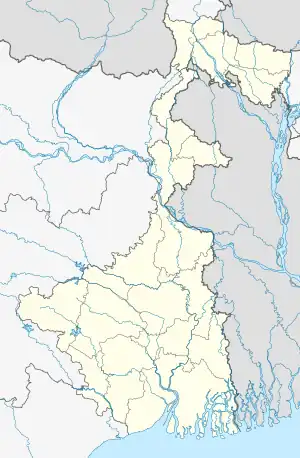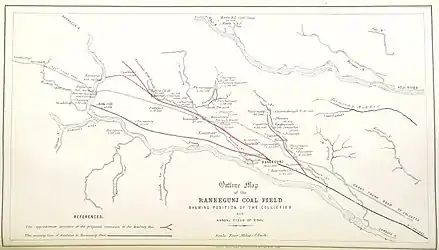| Location | |
|---|---|
 Raniganj Location in West Bengal | |
| State | West Bengal |
| Country | India |
| Coordinates | 23°37′44″N 87°06′54″E / 23.62889°N 87.11500°E |
| History | |
| Opened | 1774 |
| Owner | |
| Company | Eastern Coalfields Limited |
| Website | http://www.easterncoal.gov.in/ |
| Year of acquisition | 1975 |
Raniganj Coalfield is primarily located in the Asansol and Durgapur subdivisions of Paschim Bardhaman district of West Bengal. It spreads over to the neighboring districts of Birbhum, Bankura, Purulia and to Dhanbad district of Jharkhand.
History

Coalmining in India first started in the Raniganj Coalfield. In 1774, John Sumner and Suetonius Grant Heatly of the British East India Company found coal near Ethora, presently in Salanpur community development block. The early exploration and mining operations were carried out in a haphazard manner.[1]
Regular mining started in 1820, led by an agency house, Alexander & Co. In 1835, Prince Dwarkanath Tagore bought over the collieries and Carr, Tagore and Company led the field. For the entire 19th century and a major part of the 20th century, Raniganj coalfields was the major producer of coal in the country.[1]
At the behest of William Princep, Carr, Tagore and Company joined hands with Gilmore Hombray and Co. in 1843 to form Bengal Coal Company, which opened up coal mining activities. Their headquarters was at Sanctoria. Other mining companies included Birbhum Coal Co., Equitable Coal Co., Madhu Roy and Prasanna Dutta Co., Bird and Co., South Barakar Coal Co., Andrew Yule and Company Ltd. and Balmer Lawrie.[1][2]
In 1886, W.W.Hunter wrote, "Raniganj Coalfield has been estimated at an area of 500 square miles. In this ‘black country of India’, which is dotted with tall chimney stalks, many European companies are at work, besides many native firms. At first coal was raised from open workings; but regular mining is now carried on, according to the system known as ‘pillar and stall’… The miners are all drawn from the aboriginal races, chiefly Santals and Bauris, who are noted for their endurance and docility."[3]
2008 status
All non-coking coal mines were nationalized in 1973 and placed under Coal Mines Authority of India. In 1975, Eastern Coalfields Limited, a subsidiary of Coal India Limited, was formed. It took over all the earlier private collieries in Raniganj Coalfield.[2]
Raniganj Coalfield covers an area of 443.50 km2 (171.24 sq mi) and has total coal reserves of 49.17 billion tonnes, spread across Indian states of West Bengal and Jharkhand.[2] That makes it the second largest coalfield in the country (in terms of reserves).[4] Out of the total reserve, 30.61 billion tonnes is in the West Bengal and 18.56 billion tonnes is in Jharkhand.
Coal seams
In the Raniganj Coalfield the coal seams can be divided into two blocks – Raniganj measures and Barakar measures. The following areas of ECL are covered by the Raniganj measures: Raniganj-Pandaveswar, Kajora, Jhanjra, Bankola, Kenda, Sonepur, Kunustoria, Satgram, Sripur, Sodepur and Salanpur (partly). Barakar measures cover two areas of ECL: Salanpur and Mugma.[2]
ONGC’s preliminary assessment of coal-bed methane indicates that four Damodar Valley coalfields – Jharia, Bokaro, North Karanpura and Raniganj – to be the most prospective.[5]
Key 2013 figures
The following are the highlights for fiscal year 2012-13[2]
- Coal production = 33.90 million tonnes
- Annual turnover = ₹12,076.17 crore (US$1.5 billion)
- Profit before tax = ₹1,897.18 crore (US$240 million)
- Manpower = 72,973
- Number of operating mines = 98
- Underground = 77
- Open-pit = 21
Operating areas
A broad area-wise distribution of coalmines of Eastern Coalfield Limited is given below:[6]
| Area | Collieries |
|---|---|
| Bankola | Bankola Colliery, Khandra Colliery, Kumardih A Colliery, Kumardih B Colliery, Moira Colliery, Nakrakonda Colliery, Shankarpur Colliery, Shyamsundarpur Colliery, Tilaboni Colliery |
| Jhanjra | Main Industrial Complex (MIC), I & II Incline, I & B Incline, 3 & 4 Incline |
| Kajora | Central Kajora Colliery, Jambad OCP, Jambad UG, Khas Kajora Colliery, Lachipur Colliery, Madhusudanpur Colliery, Madhabpur Colliery, Naba Kajora Colliery, Porascole Colliery |
| Kenda | Bahula Colliery, Chora Block Incline, CL Jambad Colliery, Chora OCP, Haripur Colliery, Lower Kenda Colliery, New Kenda Colliery, Siduli Colliery, SK OCP, West Kenda OCP |
| Kunustoria | Amritnagar Colliery, Amrasota Colliery, Bansra Colliery, Belbaid Colliery, Kunustoria Colliery, Mahabir OCP, N. Searsole Colliery, Parasea Colliery, Parasea 6 & 7 Incline, Parasea OCP |
| Mugma | Badjna Colliery, Bermury OCP, Chapapur Colliery, Gopinathpur Colliery, Hariajam Colliery, Kumardhubi Colliery, Khoodia Colliery, Kapasara Colliery, Lakhimata Colliery, Mandman Colliery, Rajpura OCP, Shampur B |
| Pandaveswar | Dalurband Colliery, Khottadih OCP, Khottadih UG, Mandhaipur Colliery, Manderbony Colliery, Pandaveswar Colliery, South Samla Colliery |
| Rajmahal | Lalmatia Coalfield in Godda, Jharkhand |
| Salanpur | Bonjemehari Colliery, Barmondia Colliery, Dabor, Gourandi Colliery, Gourandi Begunia Colliery, Mohonpur OCP |
| Satgram | Chapui Khas Colliery, JK Nagar Project, Jemehari Colliery, Kalidaspur Project, Kuardi Colliery, Nimcha Colliery, Pure Searsole Colliery, Ratibati Colliery, Satgram Project, Satgram Incline |
| Sodepur | Bejdih Colliery, Chinakuri 1 & 2 Colliery, Chinakuri 3 Colliery, Dhemomain Incline, Dhemomain Pit, Dubeswary Colliery, Methani Colliery, Mouthdih Colliery, Narsamuda Colliery, Parbelia Colliery, Patmohona Colliery, Sodepur Colliery |
| Sonpur Bazari | Sonpur Bazari Project |
| S.P.Mines | Chitra in Deoghar, Jharkhand |
| Sripur | Bhanora West Block Colliery, New Ghusick Colliery, Kalipahari Colliery, Ningha Colliery, S.S.I. Colliery, |
Note: All the linked Area pages provide relevant details of the collieries and carry maps indicating the location of the collieries. All the operational areas are in Raniganj Coalfield, except Rajmahal and S.P. Mines.
See also
References
- 1 2 3 Akkori Chattopadhyay, Bardhaman Jelar Itihas O Lok Sanskriti , Vol I, pp. 46-51, Radical, 2001, ISBN 81-85459-36-3
- 1 2 3 4 5 "Eastern Coalfields Limited". Eastern Coalfields Limited. Retrieved 14 July 2014.
- ↑ W.W.Hunter, The Indian Empire: Its People, History and Products, first published 1886, reprint 2005, Asian Educational Services, New Delhi, ISBN 81-206-1581-6
- ↑ "Coal Resources of india". geologydata.info. Retrieved 2008-08-31.
- ↑ "Coal Bed Methane" (PDF). CBM Potential in India. Eastern Coalfields Limited. Retrieved 2008-08-26.
- ↑ "Area-wise Closed User Group (CUG) Telephone Number". Eastern Coalfields Limited. Retrieved 11 August 2018.